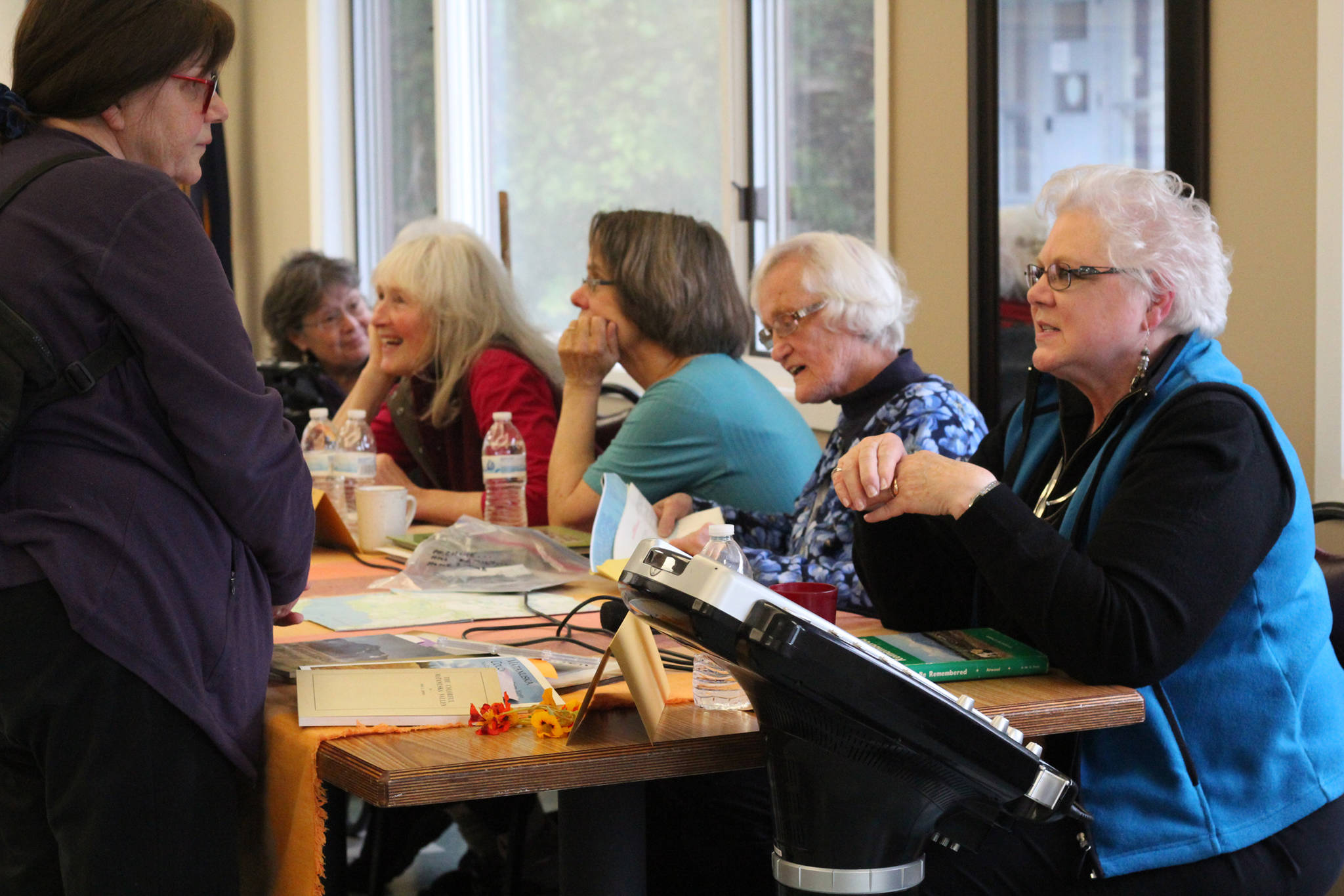Graduation held in an airport hangar, harrowing commutes to work across the tumultuous Cook Inlet, and mail dropped by airplanes overhead. While these may sound like situations of the far-off past, some Homer residents alive and well today are here to dispel that notion.
On Saturday, Oct. 14, four local women whose families were pioneers and homesteaders in Alaska spoke to a crowd at the Homer Senior Citizens Center about how different life was only 50-60 years ago in the Last Frontier. One of the women, Marie Anderson Walker, brought along her certificate of birth for the Territory of Alaska.
Being born in a state before it was a state created an interesting situation for Walker. When she got older, some people her age had trouble getting drivers licenses or into the military because of the unusual territorial documents.
Along with Pam Middleton Hooker, Mairiis “Mossy” Kilcher and Barbara Perkins Hill, Walker told tales of adventure, ingenuity and what it took to build a life in early Alaska, which wasn’t always easy before the state became as established as it is today.
Walker recalled one instance in which she hurt her finger and her mother took her to see the local vet because he was much closer than the nearest doctor. It was also Walker who had her graduation ceremony in a hangar at Elmendorf Air Force Base.
Hooker described the difficulty of establishing a homestead, especially during winter. She recalled with a smile that when she graduated high school, her family was still living in the “temporary” dry cabin her father had built when they first got to Homer when Hooker was a toddler.
A common theme throughout the panel was the particular struggle women in Alaska faces during the pioneering days, that of performing hard work and generally not being recognized for it, or being kept from the same kinds of work or adventures as their male counterparts.
“Having brothers, one of my hardest things to deal with all my life was, ‘You’re a girl, you can’t do that,’” Walker said.
Hooker relayed that her own mother undertook the move to Alaska while she was 7 months pregnant. Eventually, her mother cut off her long hair, which Hooker said her mother had kept because her father liked it, because it was too much to deal with while living in a temporary dry cabin with young children.
Kilcher recalled that her main daily chore was milking the cow. As the oldest sibling, she said that by the time her first brother came along, she and some of her sisters had already “been there, done that.”
“We could run circles around the guys, not that anybody would ever know it because, you know, women in those days didn’t get a lot of credit for a lot of things,” she said.
Kilcher especially credited her mother, Ruth Weber, for all the work she put into raising their family and working on the homestead.
It was during her time spent in the family’s fields taking longer than necessary to find and milk the cow that Kilcher said she fell in love with nature, birds in particular.
“Nature was my house,” she said.
Hill told several stories that established her as one of those hard-working female pioneers. She and her husband began work on a homestead at Point MacKenzie in the mid-1950s. As a veteran, her husband was only required to live on the homestead for seven months as opposed to the three years other new homesteaders were required to stay at the time.
She detailed how she and her husband worked to clear their land and plant crops. Since Hill was pregnant at the time, she had to go back across the Inlet to Anchorage to give birth. The crossing became a regular commute for the couple, as Hill’s husband still worked in Anchorage. A trip across the Inlet, the main body of which has volatile tides reaching 25 feet, took about 30 minutes to an hour depending on the weather, she said.
Hill relayed a story of one crossing from Anchorage back to Point MacKenzie in particularly rough weather, such that she showed up to the school she taught at that day covered in mud and without her boots.
Despite the rough living conditions that defined Alaska’s early pioneering days, the women on the panel said they had the best childhoods, or, in Hill’s case, a most adventurous life.



